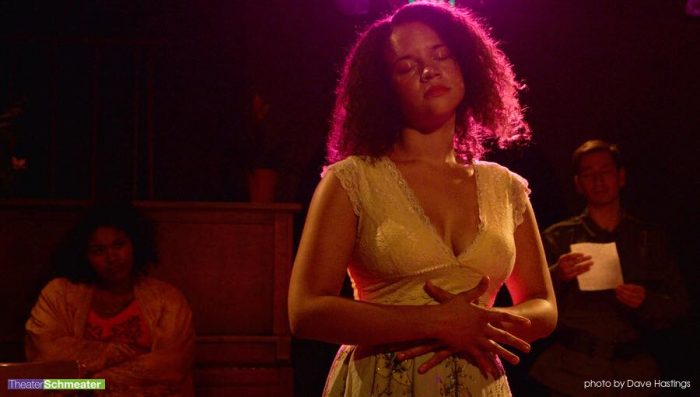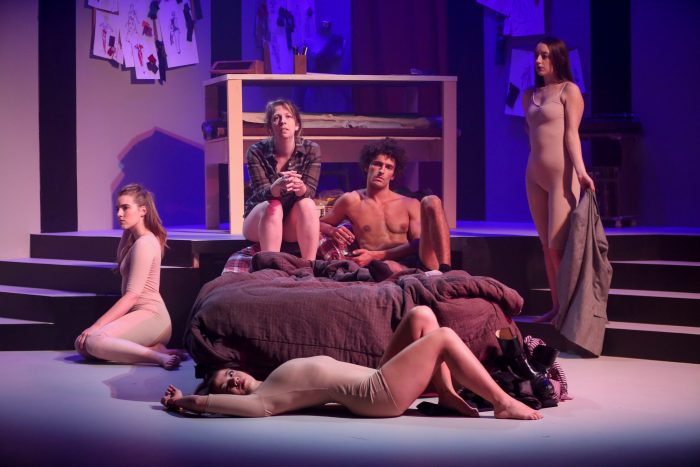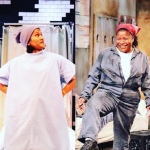MORE recent theater openings to check out….here’s two from smaller companies, Theater Schmeater and Washington Ensemble Theatre. Both have talented casts/production teams but only one production has a beautiful script.

Theater Schmeater’s production of TWO SISTERS AND A PIANO with (left to right) Aviona Rodriguez Brown, Marquicia Domingue and Roger Estrada runs through October 6th. Photo by Dave Hastings.
The best play of the bunch is Nilo Cruz’s TWO SISTERS AND A PIANO, the gay Cuban-American playwright’s 1998 drama about the lives of a pair of young sisters under house arrest in Castro’s Cuba circa 1991. The two are confined to their family home after 2 years in prison for supporting perestroika, the reform movement that began in the Soviet Union in the 80s but quickly spread to other Communist countries struggling with the needs for economic and socio-political reforms in their tightly controlled societies. Castro refused to let perestroika gain a toehold in Cuba and quickly clamped down on any dissent with imprisonment. Writer/activist Maria Celia and her younger sister Sofia, a pianist had signed a document supporting perestroika for Cuba and were punished with prison followed by a decree of house arrest for an undetermined amount of time.
The sisters suffer from being deprived of the freedom to leave their home or to receive any visitors other than the soldiers and government officials who frequently drop by to inspect the home and question the sisters, especially Maria Celia who has a dissident husband living abroad who is trying to get the sisters out of Cuba by seeking political asylum for them in other countries. Maria Celia copes with her loneliness and pain by writing and reading to her husband. Meanwhile, the passionate and more restless Sofia, copes with her sexual frustration through her music and eavesdropping on the neighbor next door.
One of the officials who stops by with increasing frequency is Lieutenant Portuondo who seems to be smitten by Maria Celia and some of her liberal beliefs despite the fact they clash so violently with his own. And, when a visiting piano tuner seems interested in Sofia, more tensions arise as these new potential relationships undermine the beliefs and hopes of all the characters and their pre-existing relationships between the sisters and between Maria Celia and her absent husband.
It’s not a happy, fun play by any means but Nilo Cruz’s gift for creating rich dialogue and passionate characters and interesting conflicts between his characters adds up to a play with great resonance and emotional power. It’s that rare modern play that also works as a piece of great literary art….Cruz constructs plays that have a natural progression to them; the twists and turns the story takes can’t be taken for granted because there’s logical progression within the romance and the pain the characters endure on their journey. This isn’t formula theater or story telling. It’s complex and soulful and tinged with beauty as well as pain.
And, Theater Schmeater has done a solid job of producing this beautiful text with José Amador’s nurturing direction of the 4 young actors, especially Marquicia Dominguez as elder sister Maria Celia and Aviona Rodriguez Brown as the piano playing Sofia. The two young actresses are a solid team here as two very different personalities but emotionally and strongly bonded as sisters and compassionate allies. Both young women give excellent performances here with strong support from both men, Roger Estrada as the questioning lieutenant and Joshua Holguin as the piano tuner.
The play is a lovely piece of dramatic literature and the Schmee’s lyrical treatment of the material serves it well. Two Sisters and a Piano is a bittersweet charmer of a play and this production is highly recommended.
Review: TWO SISTERS AND A PIANO by Nilo Cruz. Produced by Theater Schmeater. Directed by José Amador. Set Design by Konstatin Lazarov. Costume Design by Maggie Carrido Adams. Lighting Design by Shannon C. Miller. Sound Design by Dayana Capulong. With Marquicia Dominguez, Aviona Rodriguez Brown, Roger Estrada, Joshua Holguin. Now through October 6, 2018 at Theater Schmeater in Belltown/Downtown Seattle.
Our next play isn’t blessed with the same quality of script.
It’s a messy comedy called EVERYTHING YOU TOUCH by playwright/TV writer Sheila Callaghan and it’s one of those quirky plays that desperately wants to be “alternative” but it isn’t subversive, shocking or even campy enough to be considered any of those things. It desperately wants to be a feminist empowerment comedy about the fashion industry and the importance we place on looks and being ‘true to our real selves’ but it’s rather lazy about any of those themes. And, oddly for a play billed by its publisher, Samuel French as: “Everything You Touch is a viciously funny look at the struggle to find an identity that’s more than skin deep…” and as a female star vehicle, and with the key words “women’s issues”, it really fails at all those things since it’s not that vicious, not that funny and ultimately seems to revolve around the male character that dominates both timelines of this play.
Which leads me to Problem #1 with this play: its dual timelines aren’t very apparent….the play takes place at two different times, with one thread happening now-ish and the other circa 1970s something but if the script makes that apparent, the direction of this production certainly did not. Director Maggie Rogers never gets any kind of rhythm going with the material…both halves seem to be rather sloppily throw together with the end result of it all seeming sloppy and ill defined.
As for dealing with women’s issues or this being a female star vehicle, neither of those descriptions seems very apt either. The play really centers on a obviously mythological STRAIGHT fashion designer named Victor (who occupies both timelines) who is a superstar in NY fashion circles in the 70s complete with a bitchy stuck up muse named Esme who gets to wear a lot of great 70s inspired clothing in this production. When Victor falls for a new muse, a chubby tourist from Arkansas named Louella, Esme’s life at the top takes a tumble.
Victor is also at the center of the modern story which features Jess, a frumpy 30ish computer programmer who is down on herself and her life in general. Despite the fact that Jess has a male co-worker named Lewis who obviously has a crush on her, she seeks a way out of her rut with the help of Victor who gives her a makeover in order to cope with a much dreaded reunion with her dying mother back in Arkansas.
Magically, (and unconvincingly) both threads rather clunkily/sorta meet up at the end and all the loose ends are….well, they’re still there really….dangling threads wafting in the smoky breezy of this awkward plot and these never fully developed characters. Which is a shame actually because the three main female characters all have promise. Jess is a bit of a frumpy stereotype but Esme is certainly an interesting (albeit not particularly original character: bitchy fashionista is not ground breaking) and while Louella is a comic hoot she’s also one that doesn’t really get much to do. Yet all these characters have potential…they just don’t have anything very original or funny or creative to do while on stage.
Meanwhile, the male lead, Victor has TOO much to do. For a female empowerment play this plot seems way overly concerned with Victor and his issues….which aren’t that interesting. His character is about as deep as his fashion skills which appear to mostly consist of ripping off Halston and Diane von Furstenberg. His chief characteristic appears to be chain smoking. He’s as emotionally deep as an ashtray.
There’s also the uncomfortable use of 5 young actresses to play models who act as a sort of chorus for the play’s themes. They’re like the Oompa Loompas in “Willy Wonka” but less orange and wearing more Quiana. And, since models are seen as objects by the fashion industry, clothes hangars to showcase the fashion, these 5 models are actually USED as objects, portraying various inanimate objects or prop holders to hold other objects at the service of the rest of the actors. It’s frankly a clumsy device…not particularly original and boringly offensive in its execution…its not so much shocking as just overstated and obvious while making its belabored point. No, women aren’t “things” but treating them as such to make a tired point in a floppo play is almost as bad as being oblivious to the actual dehumanization of women.
There are humorous moments in the play; it’s never boring though it is frequently confusing as to where the hell you are at any given point in the timelines. It’s pretty to look at with some lovely costumes from Jennifer Oaster (but also a couple choices I didn’t much care for). For once, Tristan Roberson’s scenic design was….ok. We’ve gotten so used to his usual fantastically creative set/lighting designs that when it’s just serviceable, it’s a bit of a shock.
The female actors have slightly more interesting characters to play but the writing doesn’t live up to those character’s potential despite the talents of Kiki Abba as Jess, Dayana “Dayo” Vice as Louella and especially Cheyenne Barton as Esme who has little to do in Act 1 but then gets some good material to play in the second half. And, as I’ve already stated, the main male role of Victor is awkwardly written and coupled with the equally awkward direction, it’s not Kevin Kelly’s best performance…though he looks great in the clothes.
But, that’s probably the main problem with Everything You Touch…it’s such a tritely written play that it’s a case of the play “wearing” the actors and crew. It’s fashionably vapid theater.




















